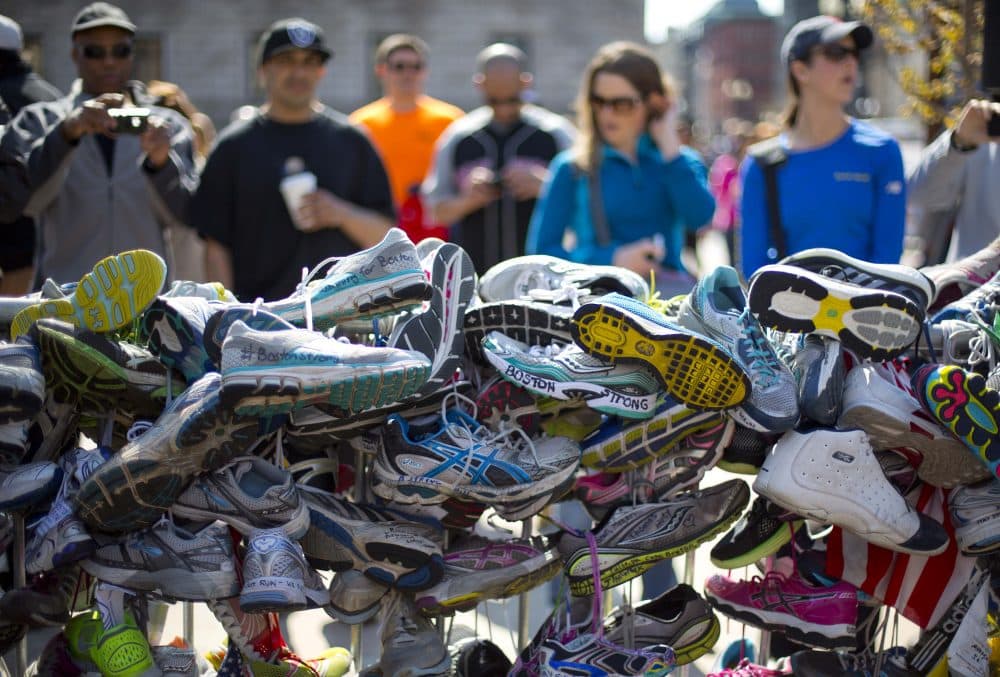Advertisement
COMMENTARY
Honoring The Community That Helped Heal Boston

The Boston Marathon has long been a celebration of community, from the pre-race dinner that brings runners together on the eve of the run to the cheering crowds stretching all along the 26.2-mile course.
Community has also played a critical — and perhaps underappreciated — role in helping many of the victims of the 2013 Boston Marathon bombing through their mental health recovery process.
The effective response by the medical community to the physical wounds of the victims in the immediate aftermath of the Marathon bombings has been well documented, and the heroics of many formal and citizen responders are credited with saving lives. While there have been few studies on the mental health response to the bombings, it is clear that formal caregiving promoted healing.
Research shows that the “help of perfect strangers” is very important in healing and resilience for those affected by tragedy. The same is true of strong community support.
The bombings left many of the injured, responders, spectators and others with short- and long-term mental health needs. Significant resources were dedicated to professional mental health care from the start. And there is evidence that formal mental health efforts — from crisis counseling to psychological first aid, therapy and treatment of long-term trauma such as post-traumatic stress syndrome, anxiety and depression — were highly effective.
Receiving far less attention were the healing effects of a wide variety of informal supports provided by friends, families, individuals, small groups and community organizations with no direct links to formal therapy.
Research shows that the “help of perfect strangers” is very important in healing and resilience for those affected by tragedy. The same is true of strong community support. We saw this firsthand as good people in Boston and elsewhere took many avenues to help one another deal with the wrenching emotional toll of the attacks, creating solidarity in the face of disaster.
Perhaps the most memorable and galvanizing moment was the raw emotion from David Ortiz when he told a crowd at Fenway Park days after the bombing: “This is our f---ing city.” But there were many other community gestures that had a healing effect. Hundreds of people placed flowers, teddy bears and running shoes in a Copley Square memorial that was later moved to the city archives. Nearly 3,000 people showed up at the Marathon finish line to pose for a Sports Illustrated cover. There were poems, plays, meals, gifts, letters, websites and innumerable “random acts of kindness.”
Survivors reunited and developed close, long-term relationships with others in the One Fund community and with the strangers and caregivers who had helped them. Survivors and their families joined peer support groups. Yoga, mindfulness and other calming exercises were helpful. One nurse climbed all 48 New Hampshire peaks, leaving bombing mementos and offers to help on each one.
Crisis counseling and psychological first aid were essential in the immediate aftermath of the bombing, and their value and the importance of continuing care cannot be overstated. And yet informal support systems also offered a sense of connectedness and loyalty that strengthened resiliency, especially for those who may not have realized they needed counseling or support after the disaster, and there were many. It is estimated that there are between four and 50 psychological victims for every physical casualty in a terrorist attack. A survey one week after the Sept. 11, 2001, terror attacks showed that 44 percent of adults and 35 percent of children had one or more substantial symptoms of traumatic stress.
Informal support systems also offered a sense of connectedness and loyalty that strengthened resiliency, especially for those who may not have realized they needed counseling or support after the disaster, and there were many.
Behavioral health is an increasingly critical component of planning for disasters and terrorist attacks. The Marathon bombing’s aftermath demonstrates the importance of meeting post-disaster mental health needs in both formal and informal ways. Social supports that supplement formal therapy are crucial to recovery.
When two terrorist bombs shattered lives at the finish line of the 2013 Boston Marathon, the spirit of community was not broken, and the outpouring of public support has been a significant factor in healing psychic wounds. Four years later, Boston must be conscious of every person who continues to suffer and be sure to provide them with that critical community support.
